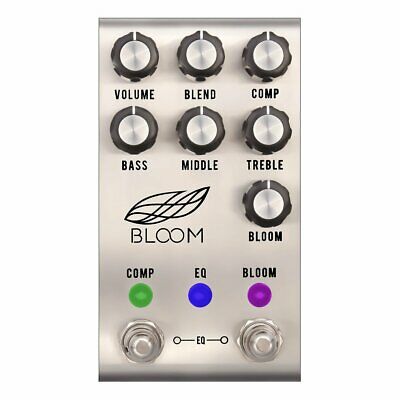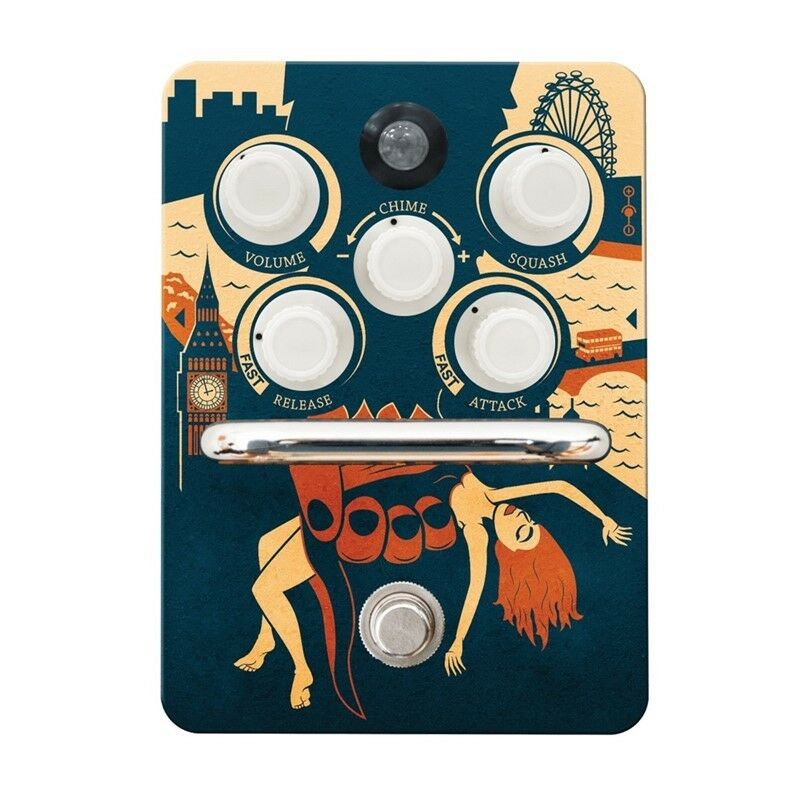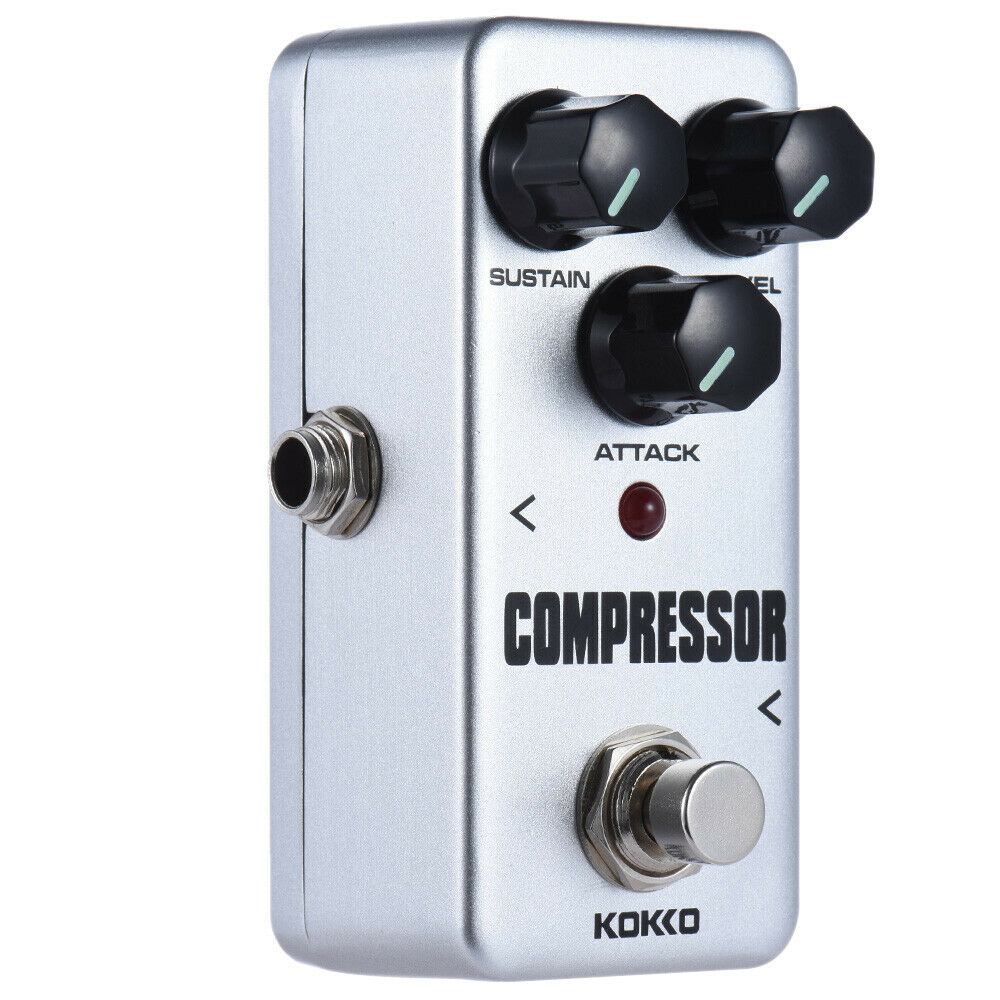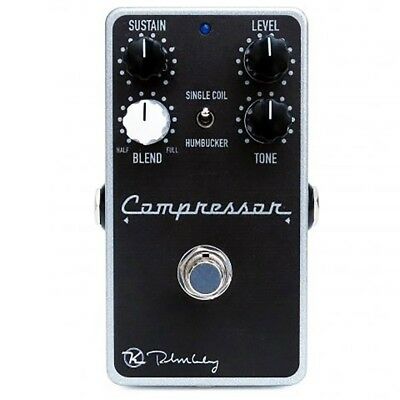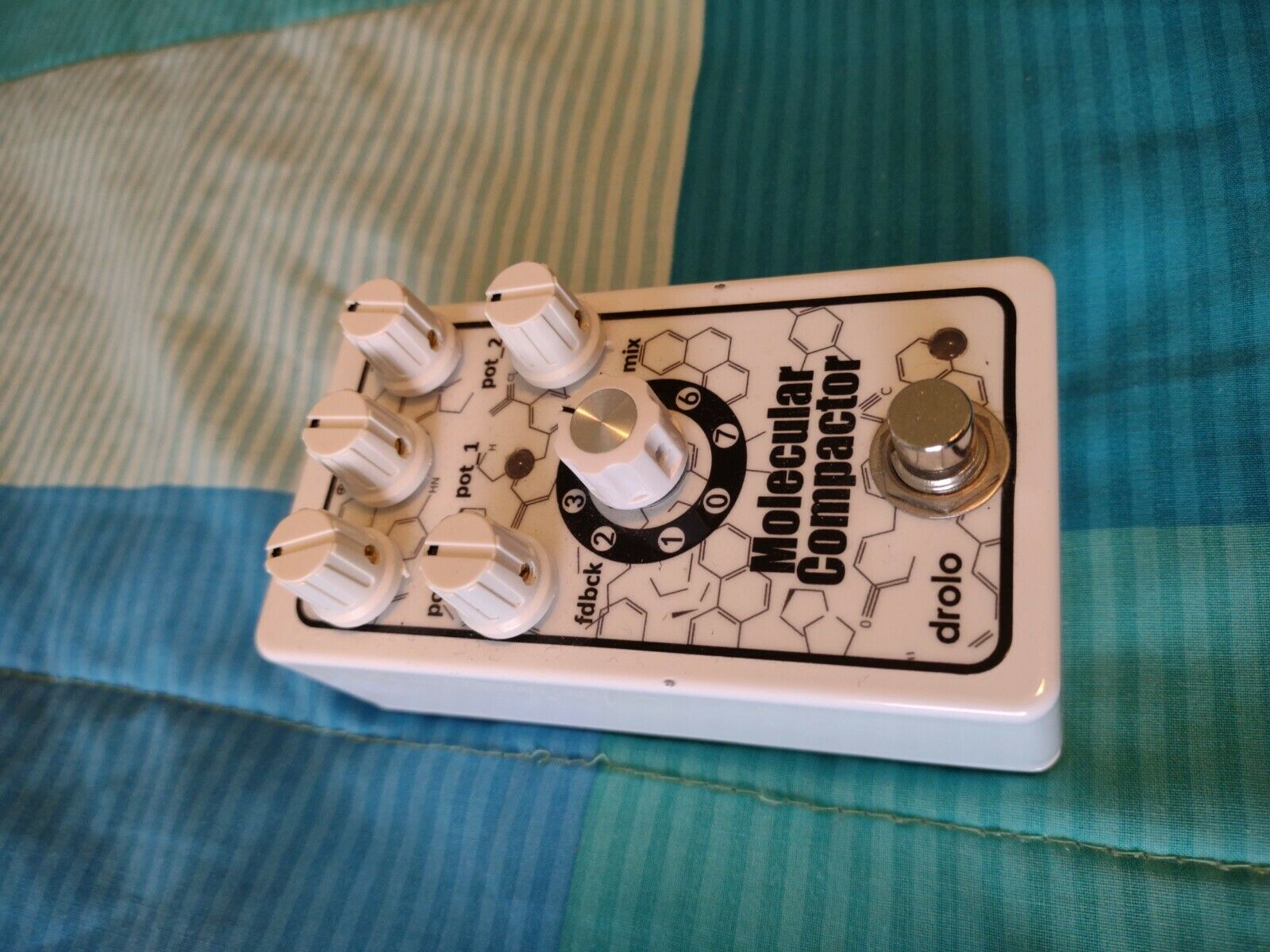-40%
Jackson Audio Bloom V2 Midi EQ Boost Compression Pedal
$ 173.71
- Description
- Size Guide
Description
The BLOOM from Jackson Audio is a comprehensive dynamic engine that is designed to give guitarists maximum dynamic tonal control in ways never before possible.The BLOOM v2 – MIDI takes everything people love about our original BLOOM and updates it with MIDI! The BLOOM v2 – MIDI now offers MIDI control over all 6 compression settings, circuit ON/OFF (COMP, EQ, BLOOM) and bloom level; the bloom level can also be expressed via MIDI!
A three-fold device, the Bloom manipulates the dynamics of the instrument by way of precisely tuned optical compression, equalization, boost and sustain circuits which can be activated separately or in tandem with each other. Keep reading below to learn how the BLOOM has become a modern classic on countless pedalboards!
COMPRESSOR OVERVIEW
As a compressor, the Bloom features an optical limiting circuit that takes its inspiration from compressors designed during the golden age of vacuum tube circuits. Optical compressors as they are called, are known for their transparency and subtlety. While the Bloom can provide a very aggressive response at more extreme compression settings, its real strength lies in its ability to add a gentle sweetening and roundness to the tone as the optical circuit works to polish off any rough edges in the sound. Because of its natural and touch responsive bloom, the Bloom is ideal for players who typically don’t use compression but want the ‘mastered’ response that optical compression gives a guitarists tone.
The frequency response of the compressor section is flat as a board and does not boost or cut any of your highs or lows. In fact for the demo videos we recorded, Dow Tomlin (Bass Player for Wynonna Judd) used the Bloom on his bass the entire time and loved it! Just like a well-designed compressor should, the Bloom alters the dynamics of the guitar signal and not the tone. A good compressor should be felt and not heard.
DUAL COMPRESSION – AKA SLIDE MODE
During the design phase of the Bloom we consulted with slide master Joey Landreth, of The Brothers Landreth fame, on what an ideal compressor for guitarists as well as slide players would be. After going back and forth with him it soon became clear that to build the ultimate compressor for guitarists we would have to include the option to run two compressors in series with each other to provide the legendary Lowell George slide tone. Lowell George, the bandleader/singer/songwriter/guitarist for the band Little Feat was famous for using two Urei 1176 compressors in series with each other to give his guitar near-infinite sustain while still remaining crystal clean.
When set to compression preset 5 or “Slide Mode” the aux compressor circuit is activated and placed in series ahead of the primary compressor. The tonal result of using two compressors in series is that notes will sustain almost endlessly and oftentimes break out into harmonic feedback while still remaining clear and clean! It ‘feels’ like you have an overdrive pedal on but the tone is still clean with endless sustain!
Hidden inside the Bloom, is an auxiliary compressor circuit that is identical to the main compressor circuit however without externally mounted controls. This aux compressor, which is set with a fast attack of 7.5ms, has two trimmers mounted on the right side of the pedal and are accessible when the cover is removed. These trimmers allow you to adjust the COMP and VOLUME settings of the aux compressor when using compression presets 5 and 6. More on compression presets later.
CLEAN BLEND
When more subtlety is desired from the compression circuit, we have included a BLEND control that allows the player to blend in their clean, unaffected signal back in with the compressed signal. One of the best features of the Blend control is that it allows the player to dial in a really aggressive compression setting and then blend some of their clean signal back in with it. This produces the effect of giving the note a very natural attack while slowly fading in the sustain that comes from running a high compression setting.
COMPRESSION PRESETS
If you’re not a studio engineer, many of the more fully-featured compressors on the market can be really intimidating and overwhelming with knobs for everything including attack, release, ratio, knee, etc. As a guitar player, I typically like to keep things as simple as possible and prefer to
think in terms of which settings would be the most appropriate for the style of music I’m about to play.
Not all players are the same and not all songs require the same compression settings, that’s why we have designed the Bloom to have six compression presets that give the player six distinct options for their attack and release settings. These settings run the gamut from subtle to extreme and allow the player to quickly dial in the perfect compression setting for the next song.
Preset 1 – WHITE: Limit Mode. Ultra-fast attack (2.5ms) that clamps any signal and acts as a limiter.
Preset 2 – GREEN: Country Mode. Fast attack (7.5ms) that is perfectly tailored for chicken picking or modern country.
Preset 3 – MAGENTA: R&B Mode. Medium attack (50ms) that works well for staccato rhythmic parts.
Preset 4 – BLUE: Ballad Mode. Slow attack (120ms) that is perfect for adding a gentle lift to the end of a phrase.
Preset 5 – AQUA: Slide Mode aka ‘Joey’ Mode. Adds an additional internal compression stage in series before the primary compressor and allows for nearly endless sustain on clean guitar parts ala Lowell George from Little Feat.
Preset 6 – ORANGE: Aux Compressor. The aux compressor is the internal compressor circuit that is used in Preset 5. There are two trimmers located on the side of the pedal that allow the user to adjust the COMP and VOLUME for this additional compression stage.
Note that each compression preset has its own color setting on the COMP led. This led color will change as you play and will change more dramatically the harder you play and especially when higher settings on the COMP control are used. If you see the color change, that means that the compressor is ducking the level of what you are playing.
MIDI – NEW FOR 2019!
Since the BLOOM first came out, we have received many requests from our players saying that adding MIDI to the BLOOM would make it the perfect compressor and we completely agree! Always we take player feedback as a primary driver of product development and we are very proud to announce that the most flexible compressor on the just got better with the addition of MIDI! NOTE: In order to accommodate this new feature, for space reasons, we were required to eliminate the SIDECHAIN that the original BLOOM featured.
CABLE INFORMATION: In order to use MIDI on the BLOOM v2, you will need a cable that converts a MIDI (DIN-5) connector to a TRS cable. This is the cable that we have used with great success and can't recommend it enough.
For those building their own cables, the BLOOM v2 receives MIDI information via the RING connection on a TRS (Tip, Ring, and Sleeve) connector.
MIDI CHANNEL
By default, the BLOOM v2 – MIDI ships with MIDI Channel 1 being the selected channel. This can be changed by pressing and holding both the COMP and BLOOM footswitches while applying power to the BLOOM. While holding these footswitches down adjust the BLOOM knob. All the way down is MIDI Channel 1…all the way up is MIDI Channel 16 with channels 2-15 being located evenly between those two points as you rotate the BLOOM knob.
You’ll notice that as you rotate the BLOOM knob, the BLOOM LED will flash to indicate which MIDI channel you have selected. IE – 7 flashes = MIDI Channel 7. After the LED flashes, we inserted a 2-second pause so you could tell when the LED was finished flashing. The LED will continue flashing as long as you are holding down the two footswitches. Once you have selected the MIDI channel you want and have verified it by counting the flashes, simply release the two footswitches and the pedal will save this MIDI Channel to the internal EEPROM on the microprocessor and reboot.
